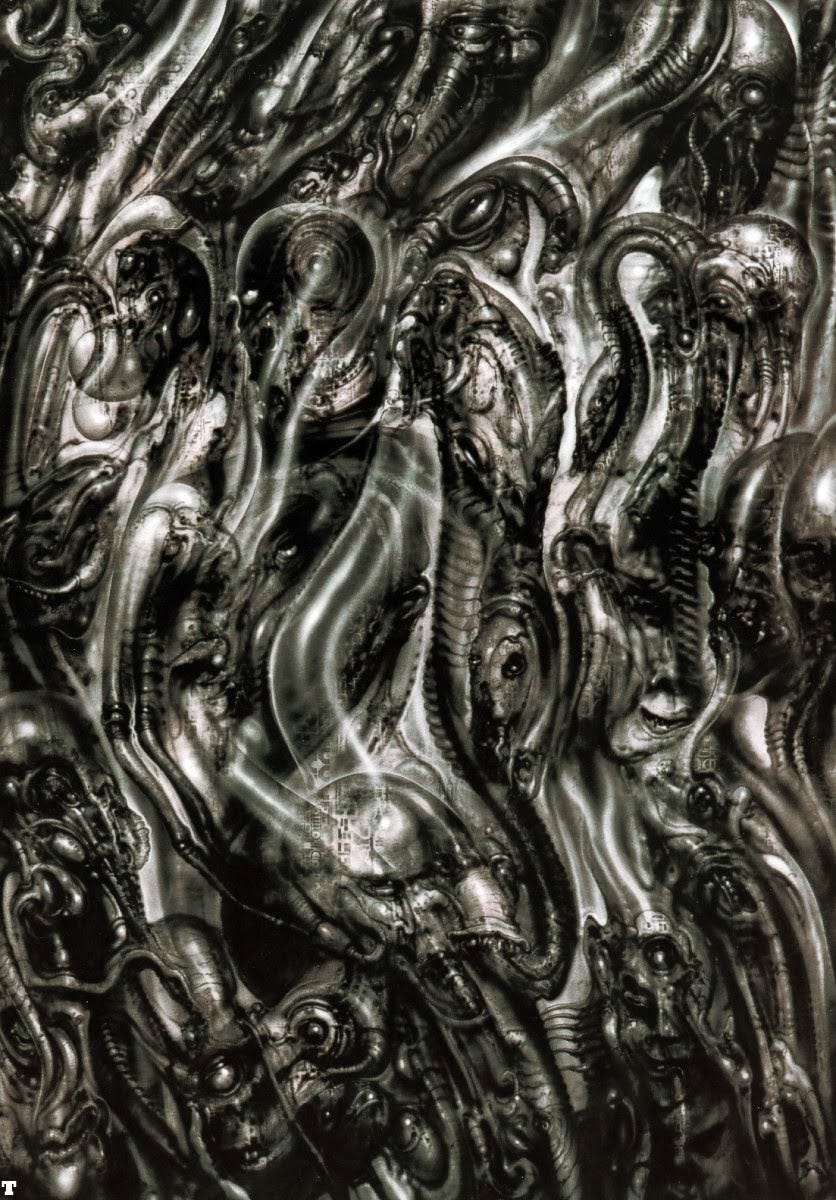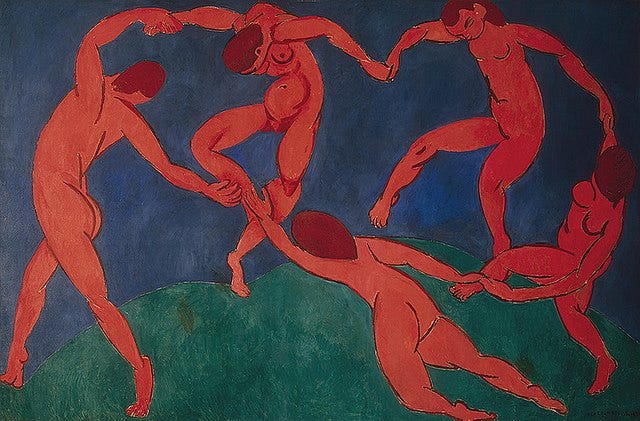To Stand In the Self
In Musings on My Mentor, I wrote of the many frustrating ways my mentor subverted my desire for knowledge. We were both writers, and he understood all too well this peculiar avenue for spiritual bypassing. Indeed, it’s endemic in online spirituality: the mistake of thinking that because you can speak articulately about a concept, you also have an embodied understanding of the experience to which it points.
Sometimes this is bloviation, pure ego, spiritual cotton candy. Sometimes it’s a genuine mistake, resulting from conditioned reliance on the algorithmic mind over the wisdom of the organic, emergent body. Both are illusory, of course, empty phenomena in awareness. But when we compare the artifacts of cognition with the artifacts of embodiment, we find that feelings can operate at pitches and frequencies so impossibly fine, they expose how clunky, hierarchical and haunted concepts are. How imprecise. Concepts can communicate extraordinary depths, but they always do so via our feelings, because only our feelings can resonate with subtle metaphysical truths.
Of course, it turns out that shifting one’s habitual orientation away from the mind and toward the body is a long, arduous process, around which many mystical traditions and whole religions have been built. It’s not a simple problem, and it sure as hell isn’t easy. One of the best explanations for the difficulty of this, I believe, comes from the philosopher Martin Heidegger. In his phenomenological opus, Being and Time, he posits that conditioning prevents us from being free, moment to moment, because it forms patterns of behavior that operate like structures - relatively steady, stable orientations to being called “attunements.”
We are all born with a poetic attunement - that is, an orientation toward Being that privileges sensation, feeling, beauty and deep metaphorical truths. It is not a coincidence that the earliest years of education for a child are in art, creativity and expression. We don’t have kids make sculptures out of macaroni because their minds are incapable of mathematics and science. We have them color and doodle and build with Play-Doh and Legos well into late childhood because they can’t be bothered to build up a reserve of anything. Their concept of the future is blessedly meager. What is urgent is how they feel now.
The mind, Heidegger says, is naturally technological - it wants to measure, to define, and in particular, to accrue reserve capacity. It derives deep feelings of satisfaction and security when it can store away power for the future, and it is all too happy to accept symbolic units of that power - whether sexual allure, money, status, or any other stand-in for capability.
When our bodies have developed enough for deeper and more mature conditioning, we subtly shift from a poetic attunement to a technological attunement. The new orientation then metastasizes and colonizes our interior worlds. By late adolescence, the instinct for acquisitiveness has hardened into a structure. It has replaced our desire to simply satisfy our needs, to make the best of our present circumstances, to find the inherent beauty in existing. We lose access to our own creative faculties, our own unique wellsprings of beauty and ingenuity. We become dependent on the energy, imagination and creativity of others for delight and inspiration. We no longer look to our own experiences and life stories for guidance, even on the most intimate decisions - how to spend our short lives serving others via our careers, how to choose a romantic partner, etc. We must rely instead on grand stories outside ourselves that provide readymade transcendence and existential succor. You already know this bunch: nation, religion, ancestry, ideology and increasingly, sexual and gender identity. The system, man.
This same “system” - not a system at all, but a kludge of competing, poorly aligned political and economic clusters - forms the popular concept of the “matrix.” There is of course the very famous movie from the 1990s (and its unmentionable sequels) but in a broader sense, this is a meme that refers to the illusory, conceptual world is overlaid atop a realer, more vivid sensory world that is much darker, but infinitely preferable. It is the Western equivalent of the Indian samsara. “Matrix” is a Latin word, meaning mother or uterus, here ingeniously used to describe the feelings of oceanic safety one gets by merging with grand narratives, in precisely the way an infant is merged with its mother. Multiple people sharing one self.
Escaping the matrix, then, means taking birth as an individual. We have to learn to derive strength from standing on our own feet, making our own decisions, earning our own victories. This means rejecting vicarious feelings on behalf of grand narratives. It means letting go of caring whether our political party is winning elections, whether our religious theology is correct, whether our ideological prescriptions will usher in the revolution, whether our nation is competitive on the world stage. It means recognizing that those narratives - and the egregoric identities they spawn - only affect us insofar as they directly affect our individual conditions in an ecological context. To take birth as an individual means building a new, bespoke internal symbolic order, based on our very small, naked existence: our own vulnerabilities, our own conditions, our own desires and needs, our own unique experience of Being.
When we are able to disentangle ourselves from these gods who do not love us and attach to our own lives - even partially - we quickly rediscover the poetic attunement. We rediscover the miracle of the present moment, our own creativity and agency, and a deep, thrumming vitality in those desires that belong only to us, that have not been downloaded from the collective unconscious. This is Kegan’s stage 5, the necessary springboard for the moksha and nirvana of Indian spirituality. It is the interindividual self, the self that prizes intimacy above scale and accrual, the self that identifies, not the self that believes it to be its identities. It is the final identification, a merging with the space in which phenomena arise, persist and cease. This is what we say when a person “has presence".” It means they have achieved the orientation toward life that poets and mystics have written of throughout time. They have discovered the true shape of the human mind - a boundless, featureless intelligence, shining in all dimensions and none.
They have become true human beings. Imagos Dei, one of the many personalities of God, shards of the divine, if you like, or the whole of It. Once you have discovered this space within you - once you have discovered that you are this space - you can hold the technological attunement without being colonized by it.
This is the fundamental mistake of spiritual bypassing: believing that knowing something and understanding something are the same thing. They are not. To understand something requires the mind to represent, as objectively as possible, a subjective experience. To merely know something without understanding it is to perform a technological impression of the poetic attunement. It is artificial intelligence.
Therefore, any spirituality worth its salt must not offer the succor of fantasy and poetry, but must confront its practitioners with the truth of their reality. It must support a person in becoming progressively less insane. If it is worth practicing, it will make you more practical. It’s no secret that many spiritual practitioners undergo a period of returning to the working class for several years - making a living as painters, carpenters, handymen, etc. - as they draw closer to Being and rediscover their natural physical intelligence and pragmatism.
Spiritual bypassing seeks the feelings of holiness and beauty that only authentically come from a poetic attunement toward life, but without the poetic work of making the present moment holy and beautiful. It gets the process precisely backwards: It is a desire for the sacred without sanctification, a desire to consume a representation of holiness, and to keep some in reserve, just in case, for later. The poetry of Rumi is a technology, The Cantate Domino is a technology, the Torah is a technology. They are storied stores of reserve sacredness, stocks of holiness we can draw on without the need for the concomitant co-construction of the sacred.
This is not an indictment of these technologies. They structure communities, change lives, give hope in dark times, give guidance in confusion - they shape history throughout the eons. They have much to recommend them. But they are not true. They are limited to representing the living, breathing, eternal truth that exists here and now.
When they replace our natural poetic orientation toward Being, they are assimilated - inexorably, inevitably - into the machine. And they, themselves become tools of assimilation.
Any spirituality worth its salt must lead human beings, inevitably, to awakening and empowerment. It must lead people to stand in the Self, to have the courage to fully inhabit our true nature. It must remind the shining, vast Void that peers out from behind each of the sixteen billion eyes on this planet Who It Is. It must help Us recognize Ourselves, thrumming with holy, gorgeous life, in Ourselves.
Any religion that truly aims to liberate the spirit must help human beings to understand this: We bypass our spirits when we bypass the present.





Thank you for this article. Been rereading it a few times now, because it generates a resonance in me - and a remembrance that I need to continue to point myself inwards, rather than seeking answers “out there”. I for one easily forget this, and continue to confuse knowledge for understanding.
you have no idea how much I needed to hear so much of what you said here. this life is a lonely one and I spend an inordinate amount of time trying to figure out how to conceptualize what it is I'm experiencing or looking to others to see if their experience at all matches mine. I often am frustratingly met by the "artificial intelligence" in the many varieties of spiritual bypassing instead of feeling any resonance of authentic experience with others. thanks as always, G.